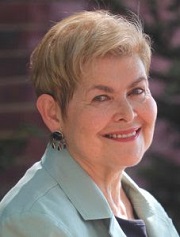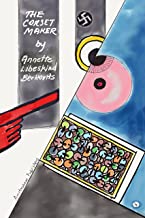Berkovits also delved into the backstory of her distinctive book cover, which was designed by her brother, world-renowned architect, Daniel Libeskind. “He did the cover and he did it in his, I would say, typical enigmatic style. He’s very avant garde in his buildings and he’s avant garde in his cover, so readers might not immediately understand the symbolism of the cover, but once they read it, they certainly will.” She also elaborated on the reasoning behind the swastika on the cover, which, she clarified, is not the same swastika that Hitler decreed. Hers differs in that it is a white swastika, set on a black circle with a gray background, as opposed to Hitler’s black swastika, on a white circle with a red background. Its placement on the cover reflects the themes of antisemitism and fascism that run throughout her book. In addition, “…Many people don’t know that the swastika is a centuries old symbol and that it used to symbolize good and it has been perverted by the Nazis. So that’s the reason the swastika on this cover has to be understood within the entire context of the book, not just judging it by the cover. ”
The Corset Maker also includes an epilogue and prologue, which not only bookends the story but also contains rich content and important, modern issues. “I ask your listeners if they read the Corset Maker, don’t skip the prologue because it really will change your understanding of what I’m trying to say.”

We do need to learn from history, and my sense is that learning about history from novels is much more interesting and palatable than learning facts in school…reading a novel you could relate to individuals. You can’t relate to 6 million or 84 million killed, but you can relate to one person and that’s why I think novels are a good way of getting across the history.


Thou shalt not be a victim, thou shalt not be a perpetrator, but, above all, thou shalt not be a bystander.
Anyone who does anything to help a child in his life is a hero to me.

Podcast: Play in new window | Download
Subscribe: RSS

WOW‼️ What an amazing wide-ranging fascinating interview of Annette Berkovits and how her MOTHER (not grandmother) inspired this resonant historical novel! The most turbulent times of the 20th century or maybe even in world history… how does one reconcile beliefs of pacifism and nonviolence when confronted with the realities of war, violence, and brutality… This interview hooked me with its wide-ranging discourse on all topics from Israel pre-independence to the Spanish Civil War, the role of women, survival of conflict, heroism, what it means to be a true supporter of democracy, and the perils of being a bystander. I loved this interview!